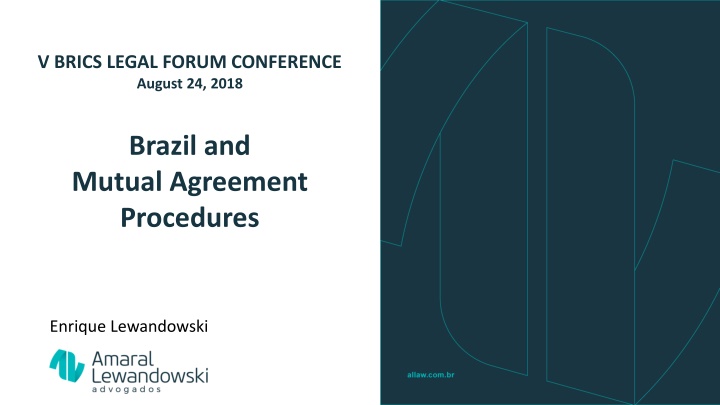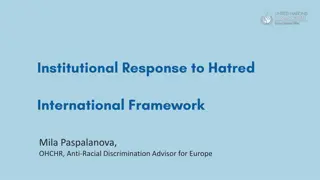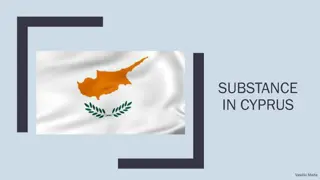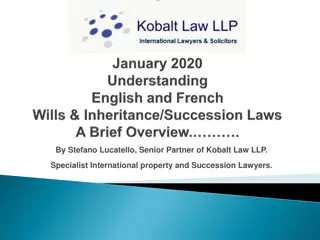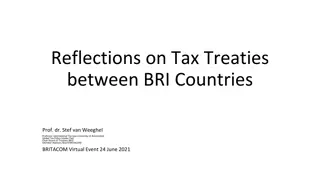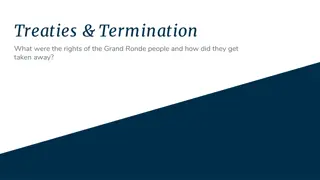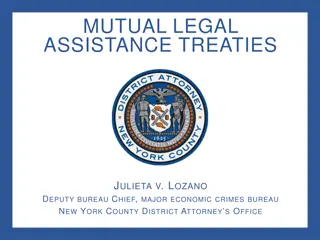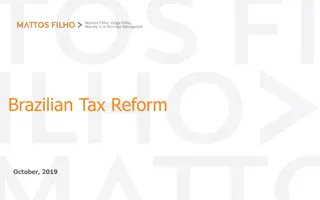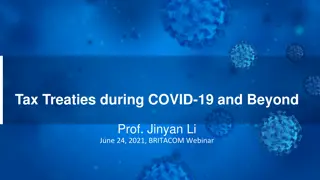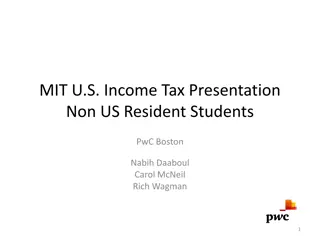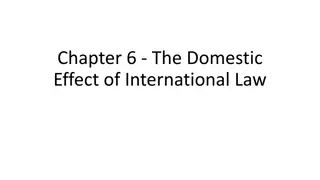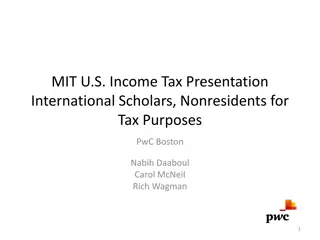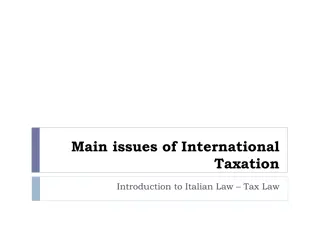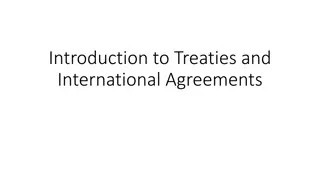Brazilian Tax System and International Tax Treaties Overview
The Brazilian tax system follows guidelines set by the Federal Constitution, with taxation principles, authority, limitations, and revenue distribution. The country has various sources of tax law, including treaties, laws, and customs. Existing bilateral double taxation treaties with countries like Germany, Russia, India, and China are discussed, emphasizing the hierarchy of treaties over domestic laws. Brazil's participation in BRICS and BEPS initiatives, its stance on the MLI, and commitment to BEPS minimal standards are also highlighted.
Download Presentation

Please find below an Image/Link to download the presentation.
The content on the website is provided AS IS for your information and personal use only. It may not be sold, licensed, or shared on other websites without obtaining consent from the author.If you encounter any issues during the download, it is possible that the publisher has removed the file from their server.
You are allowed to download the files provided on this website for personal or commercial use, subject to the condition that they are used lawfully. All files are the property of their respective owners.
The content on the website is provided AS IS for your information and personal use only. It may not be sold, licensed, or shared on other websites without obtaining consent from the author.
E N D
Presentation Transcript
V BRICS LEGAL FORUM CONFERENCE August 24, 2018 Brazil and Mutual Agreement Procedures Enrique Lewandowski
Brazilian Tax System - General Guidelines Taxation guidelines established by the Federal Constitution: General principles of taxation Authority to impose taxes Limitations on the power to lay and collect taxes Distribution of tax revenues Sources of Tax Law: Constitution Complementary Laws Ordinary Laws / Provisional Measure International Treaties Acts of Legislative and Executive Branch Customs, Case Law, Treatises 2
Existing Bilateral Double Taxation Treaties 33 DTT in force Germany denounced its treaty on 2005 and Paraguay, Switzerland and Singapore treaties have to be ratified by Congress Russia signed on Nov/2004 and ratified on May/2017 India signed on Apr/1988 and ratified on Apr./1992 China signed on Aug/1991 and ratified on Nov/1992 South Africa signed on Nov/2003 and ratified on Oct/2006 3
A Word on Double Taxation Treaties Treaties are hierarchically equivalent to ordinary laws Article 98 of National Tax Code A treaty will prevail over internal law if conflicting in any way. The treaty will override domestic law, limiting (partially or completely) its effectiveness. lex posteriori derogat prior x lex specialis derogat generalis Superior Court of Justice - Treaties are specialty laws (REsp 1.161.467/RS, Dje 01.06.2012) Treaty abuse Article 116, sole parag. general anti-avoidance rule interpreted broadly by Secretaria da Receita Federal do Brasil ( RFB ) REsp 1.325.709/RJ Tax treaty prevails over internal legislation Currently pending analysis by the Supreme Court Supreme Court decision on Consumer Protection Code international treaty prevails 4
Brazil, BRICS and BEPS Brazil does not adopt a specific Model Tax Treaty uses both UN and OECD standards All DTT Brazil agreed with BRICS provide for Mutual Agreement Procedure ( MAP ) None of them have a provision for compulsory arbitration if the dispute has not been resolved in a given period Brazil is not an OECD member, but has been actively participating on the Base Erosion and Profit Shifting Action Plan ( BEPS Initiative ) Brazil did not sign the Multilateral Convention to Implement Tax Treaty Related Measures to Prevent Base Erosion and Profit Shifting ( MLI ). According to the Brazilian Tax Administration, this innovative procedure could generate lengthy discussions in the Brazil s National Congress, thereby delaying the approval of the MLI for years, a result which would be undesirable. It rather amend its tax treaties through bilateral negotiations. Brazil did commit to implementing the minimal standards under Action 14 5
Normative Instruction no. 1,669/16 RFB in November 2016 published a Normative Instruction (IN RFB 1,669/16), which provides guidance on the requirements and criteria for taxpayers to invoke MAP under a relevant tax treaty Key Points: Non-contentious nature Unilateral phase x bilateral phase Transfer pricing matters can be the subject of a MAP, including APA BRIRS will inform treaty partner whenever MAP is initiated In the event of reaching a solution, albeit partial, the RFB will issue order of implementation giving validity to the solution found, preceded by agreement of the applicant and of the related people domiciled abroad involved in the solution; and proof of express and irrevocable waiver appeals or of administrative appeals and lawsuits that have the same object of the MAP e and waives any claim of law upon such matter 6
Normative Instruction no. 1,669/16 - Controversies No specific time frame No provision stating that the enforcement of the tax liability is suspended If agreeable solution is not reached, RFB will issue a formal decision to which there will be no request for reconsideration or appeal. Waiver of any legal claim and forfeit administrative appeals and lawsuits on the matter Conflicts with domestic dispute resolution mechanism and Brazilian tax treaties stipulate that a MAP is available irrespective of the remedies provided by the domestic law. MAP is not available if: already submitted to the administrative tax litigation or decision/judgment involves a taxpayer other than the applicant, even if belonging to the same economic group. statute of limitation has been reached (5 years) Judiciary and a 7
BRICS MAP Recommendations MAP procedure should suspend the enforceability of tax liability under discussion The formal response issued regarding MAP by Revenue authority should be uniform in every jurisdiction If unfavorable response is rendered, taxpayers must be able to access domestic dispute resolution procedures, which must include an administrative appeal prior to submitting a claim before the Judiciary It should be established that it is unnecessary to present a bond/collateral to challenge the liability MAP should have no proceeding fees or no burden to pay prevailing party s legal fees. 8
Thank You! Enrique Lewandowski enrique@allaw.com.br T +55 (11) 5180-5260 allaw.com.br 9
